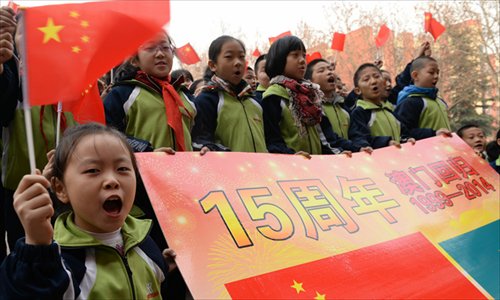Guangdong forges closer trade ties with Macao, HK
24-hour border crossing between Macao and Hengqin Island starts

Students at a primary school in Xingtai, Hebei Province on Thursday hold a banner and wave Chinese national flags in a ceremony to mark the 15th anniversary of the return of former colony Macao, which falls on December 20. Photo: IC
The Ministry of Commerce (MOFCOM) and the governments of the Macao and Hong Kong special administrative regions Thursday inked a trade liberalization deal which is expected to bring tighter cooperation in the services sector.
The trade deal comes one day ahead of President Xi Jinping's two-day visit to Macao, which on Saturday will celebrate the 15th anniversary of its return to China.
The trade liberalization deal on Thursday was drafted under the framework of the Closer Economic Partnership Arrangement (CEPA) between the Chinese mainland and the two special administrative regions. The agreements were signed in 2003 and have seen 10 supplementary agreements in the past decade.
Under the new deal, the service sector in South China's Guangdong Province will be further opened up to Hong Kong and Macao.
Liao Jingshan, director of the Hong Kong and Macao Affairs Office in Guangdong, said that the degree of openness in the province's service sector is already close to that in developed economies, Guangdong-based newspaper Nanfang Daily reported on Thursday.
Under the deal, most subsectors of the service industry will adopt a "negative list" management approach, which generally specifies the areas that are restricted to overseas investment, according to a post on MOFCOM's website Thursday.
As companies are free to invest in all areas that are outside the list under the "negative list" approach, experts said the move means greater freedom for Hong Kong and Macao investors.
A total of 153 of the total 160 subsectors of the service industry will be opened to Hong Kong and Macao service providers, and in 58 subsectors, Hong Kong and Macao companies will be treated as if they were mainland companies, MOFCOM said.
"Guangdong is losing its advantages in manufacturing amid rising costs; the service sector could be its new future," Bai Ming, a research fellow at the Chinese Academy of International Trade and Economic Cooperation, told the Global Times on Thursday.
Bai added that developing high-end services could also help to upgrade the province's manufacturing sector.
The government has stepped up efforts to boost regional cooperation in the area. On December 12, the State Council announced that three free trade zones will be built in Guangdong, Fujian Province and Tianjin. Experts noted that the Guangdong free trade zone will focus on boosting regional integration between Guangdong, Hong Kong and Macao.
Also on Thursday, the border crossing between Macao and Guangdong's Hengqin Island started to operate 24 hours a day, which will make bilateral communications more convenient. And on December 4, authorities at the Qianhai special economic zone in Guangdong released regulations meant to attract more Hong Kong companies to the region.
Greater integration in the region will benefit both sides, as Hong Kong and Macao are facing limits on their growth due to their limited sizes, said Bai. Macao has been one of the world's fastest-growing economies in the past decade. Its GDP reached 413.47 billion patacas ($51.76 billion) last year from 50.27 billion patacas in 1999, with an average annual growth rate of 16.2 percent, the Xinhua News Agency said Thursday.
But there are also worries. Macao's gambling revenue, a main contributor to its economy, has dropped for six consecutive months so far, mostly affected by the government's anti-corruption campaign.
Kwan Tsui-hang, a lawmaker in Macao, told the Global Times Thursday that the trade agreement will bring a window for Macao to diversify its economy.
Kwan added that tourism could be a potential driving force for Macao's growth.
Chang Hsiao-chuan, assistant professor of economics at the University of Macau, said the slowdown may only be short-lived amid a weak global economy.
"Gambling revenue is still much higher than other places and some casinos are still expanding their business, a sign of bright prospects for the sector," Chang said, adding that Macao's development is stable with the support of the mainland.